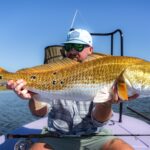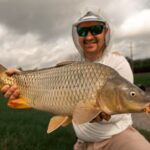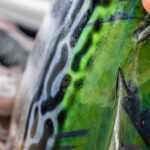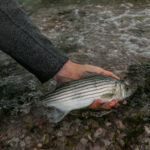
Louisiana Bull Reds Up for Harvest Again: H.B. 604 Must Not Pass
Photo Credit: Carter Abramson | Trevor Johnson Every now and then, we encounter something so
Today, March 7th, 2024, science lost another fisheries fight in Louisiana. The new Louisiana Wildlife & Fisheries Commission voted 5-1-0 in favor of amending the new NOI for Redfish regulations from a 3-fish creel limit to a 4-fish creel limit. You may ask yourself: Didn’t we win this battle already? Wasn’t the 3-fish limit with an expanded slot the compromise? If so, you are correct and get bonus points for being attentive. The 3-fish limit NOI was only days away from becoming regulation, but to the confusion of many, the 30-day oversight period was paused at the last minute. Today’s meeting was then scheduled and a new agenda was fast-tracked to a vote contradictory to the commission’s previous actions.
The NOI now heading to the legislature has a 4-fish limit with the same 18’’-27″ slot, no harvest of bull redfish and no guide limit. Make no mistake, redfish have a brighter future in Louisiana if this proposed reduction becomes regulation. This progress can be directly attributed to the relentless commitment and advocacy of our guide community, their anglers, and the rest of the conservation-minded Louisiana stakeholders. On behalf of the rest of the angling industry who loves and relies on this incredible fishery, we are indebted to your selfless determination. You cancel trips and sacrifice income. You dare to take the podium and courageously speak on a polarizing topic to benefit something greater than yourself. Thank you, sincerely.
Today, we witnessed another fisheries management body prioritize the right to harvest over precautionary action that could “right the ship.” We have seen this time and time again. The best available science shows us the writing on the wall, yet managers refuse to “rip the bandage off.” Whether you like to harvest fish, release them, or a mix of both, all our businesses and lives are made better with more fish in the water. The truth is the resource deserves much better from the managers in charge.
Louisiana redfish conservation has gained momentum in recent months. We were close to a reasonable compromise NOI becoming regulation. In the last two weeks, something inexplicably changed. Why would this commission suddenly “do a 180” and vote against its own proposal? This set of Commissioners won’t even be in their seats by the next stock assessment. We know the answer, but we will leave that for a different time and place…
The morning’s events began with an LDWF biologist presentation which ended with a new 4-fish bag limit recommendation. We genuinely feel for that entire department. There are many smart minds contributing to some of the best state fisheries science in the country. Being forced to posture your hard work to support someone else’s agenda is a difficult position that no legitimate scientist should find themselves in. This presentation was followed by a public comment period dominated by thoughtful, informed, and science-centered support for more conservation. The comments against them largely attacked their character, business models, and misquoted the best available science. By our count, the public comment tally ended at 23-11 in support of a 3-fish limit. A disheartening Commission vote followed shortly after.
Old roots run deep, and long-standing mindsets take time to recalibrate. Though after hearing this morning’s overwhelming public comment from the passionate, thoughtful stakeholders who refuse to quit on this fishery, we know this is more progress to be made going forward.
We will provide more coverage on this momentous day in the near future…

Photo Credit: Carter Abramson | Trevor Johnson Every now and then, we encounter something so

This past weekend, ASGA proudly sponsored the Dirty Carp Tournament in Louisiana — and no, you didn’t misread that.

After years of data pouring in from The Albie Project, advocacy, persistence, and support from

This morning, the Connecticut Environment Committee held a hearing on House Bill 6248, a bill
We rely on our members and donations to keep fighting for a sustainable tomorrow in marine conservation.
GIVE THE GIFT OF FISHERIES CONSERVATION THIS HOLIDAY SEASON. SHOP ASGA GOODS THAT FUND FISHERIES RESEARCH & ADVOCACY CAMPAIGNS
JOIN ASGA IN CALLING FOR CRITICAL MANAGEMENT ACTION AFTER YEARS OF SPAWN FAILURES & POOR MANAGEMENT.
By using this website, you agree to our use of cookies. We use cookies to provide you with a great experience and to help our website run effectively. To learn more, please review our privacy policy.
3 Responses
Keep at it. Most recreational fisherman like myself who use guides don’t need to keep any redfish. If anything, we will happily take just a few of other species. Keep up the good work to improve the stock.
I caught a 38 in red drum swallowed hook can I keep it
Cut the hook, release the overslot illegal fish and give it the best chance to survive, even if a reduced chance. This is how to critically think when put in this situation. Released with a 1% chance to survive is still a better outcome for that fish than 0% chance in your cooler. These are the choices we make to protect the future of the fishery.